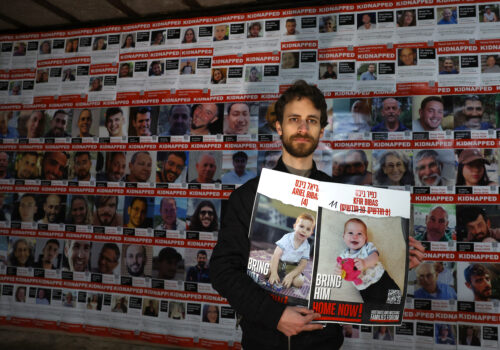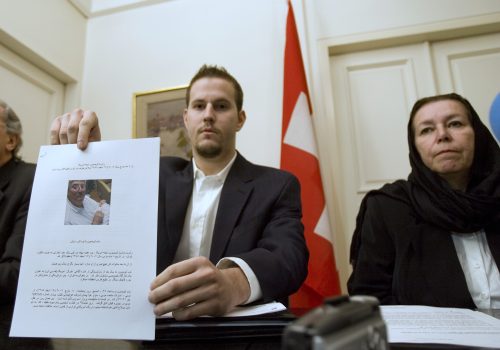Balancing a culture of secrecy and collaboration: Information sharing with hostage families
Hostage and wrongful detention cases remain a key US national security priority regardless of the fact that they represent a relatively small number of instances, as their impacts reverberate well beyond the hostage and their family. Countries like China, Russia, Iran, and Venezuela have adopted the practice of wrongful detention—hostage-taking by state actors—precisely because they recognize how impactful it can be to take a US national for use as a political pawn or simply to demonstrate their refusal to play by agreed international norms. Similarly, terrorist groups and criminal gangs continue to take hostages to extort financial or political concessions or to achieve ideological goals. As a result, this low frequency crime plays an important role in counterterrorism strategies and national security priorities.
Standard national security practice is to value the protection of intelligence, assets, methods, and sources, only sharing information on a strictly need-to-know basis. National security professionals maintain strict adherence to this culture, which is underpinned by a system of security clearances and information classification levels. This system is a cornerstone of effective national security, protecting the intelligence from getting into the wrong hands, the sources gathering the information, and the methods in which the information is obtained.
Hostage and wrongful detention cases represent a unique operational environment, as they involve the family members of the hostage, who are rarely counterterrorism experts, national security professionals, or diplomats. Imagine having a family member held hostage in a foreign country and feeling like an outsider in the efforts being carried out to secure their freedom—a reality that was initially addressed nearly ten years ago.
SIGN UP FOR THIS WEEK IN THE MIDEAST NEWSLETTER
In 2015, the approach to managing hostage-taking and wrongful detention incidents involving US nationals inherently changed, guided by policies created by the Barack Obama administration. The policy changes were the result of an extensive review that Obama personally ordered following the murders of four US nationals, including James Foley, at the hands of the Islamic State of Iraq and al-Shams (ISIS) in Syria and complaints from families in these and other cases about their treatment by the US government.
A cornerstone of the policies introduced was the recognition that families have an important role in these cases. As such, the policies enshrine a requirement for intelligence sharing between the US government and hostage families. For example, the family of a hostage who is currently held in the Middle East should be privy to intelligence related to the geopolitical situation impacting that country and thereby impacting their loved one. Families must be at the center of hostage policy for several compelling reasons:
- Reducing the emotional and psychological impacts on the family Families with loved ones held hostage find themselves in crisis—stuck in a geopolitical situation that often depends on government assistance or leadership to resolve. As US nationals, the families deserve support and transparent updates from the government during this intensely traumatizing period. A lack of transparency intensifies the stress they feel.
- Involving the most crucial stakeholder Apart from the hostage, the families are the single most important stakeholder in these cases, with their primary concern being the swift recovery of their loved one. They have the greatest motivation, and it is in their collective interest to treat intelligence prudently.
- Cooperating in resolution In numerous hostage cases, families actively contribute to the efforts to bring their loved ones home, whether by communicating with hostage takers themselves or providing valuable intelligence on the case secured through their private means. Additionally, as positions in and out of government rotate, families are often the only stakeholders in long-term cases that retain valuable historical knowledge of the case. Kidnapping—by states, terrorists, or criminals—is not always solved by governments or governments alone. In fact, when the government partners with families and operates as a united front, it can galvanize national and international support, avoiding fractured and, ultimately, counterproductive efforts.
- Broadening options Given the uniqueness of these situations, innovative methods of resolution are explored and sometimes required to bring hostages home. Families frequently contribute unconventional ideas and solutions, assisting the government in considering and exploring creative strategies. Diversity of ideas, connections, and approaches can make the difference.
The Obama administration introduced Presidential Policy Directive 30 (PPD-30) and Executive Order 13698 (EO13698) in 2015. The directive was designed to enhance efforts to respond to these crises and ensure a coordinated and effective approach across the US government. PPD-30 established two new operational offices, the Hostage Recovery Fusion Cell (HRFC), an interagency group within the FBI, and the Special Presidential Envoy for Hostage Affairs (SPEHA), an office within the State Department designed to oversee the diplomatic response to hostage and wrongful detention cases.
PPD-30 emphasizes support for hostage and detainee families, recognizing their vital role in the resolution process and the importance of transparent communication and information sharing with them. Furthermore, EO13698 mandates improved intelligence and information sharing across agencies and prioritizes information sharing with appropriate parties, including the family.
Five years later, in 2020, the Levinson Act, in the name of former Federal Bureau of Intelligence (FBI) agent Robert Levinson, who was abducted in Iran in 2007, passed into law. This law codifies provisions in PPD-30 and EO13698, including, but not limited to, engagement, intelligence sharing, and transparency of updates with families. Finally, in 2022, Executive Order 14078 (EO14078) addressed the need for enhanced coordination and communication with families. In practice, this means the parents of a man being wrongfully detained in China, for example, as the most invested parties in the resolution, would be a collaborative partner with the government and have access to information related to his well-being, the geopolitical situation, challenges surrounding ongoing negotiations, and be brought to the table to share ideas and updates of their own.
Collaborating with families and identifying relevant intelligence to expeditiously declassify and securely share it is a complex task that is not without challenges, of course. The practice inherently runs counter to the culture within national security agencies, which prioritizes protecting sensitive information. Should certain information be leaked, it could compromise ongoing operations, endanger national security goals, or disrupt delicate diplomatic relationships. Moreover, protecting sources and methods of intelligence gathering is critical to maintaining the integrity of the collection process and safeguarding agents and assets.
These reasons make it easy to revert to the comfort of guarding information from a national security perspective. However, President Obama’s policies require national security professionals to work against their training in this regard, and the cultural pull towards secrecy requires constant vigilance to overcome. Officials must continue to resolve to minimize the risks of sharing information by working hard to declassify information swiftly to share via strict protocols and secure communications channels. Additionally, officials have a responsibility to ensure families understand the information being shared and internalize the potential risks if shared further. It is worth noting that prioritizing collaboration and aiming for a quicker resolution inherently minimizes the risk of a leak because as cases are resolved more swiftly, the opportunity for an information leak from any party diminishes. As the timeline extends and families continue to wait for a resolution, frustration grows, making it imperative for the families to fully understand the risk of potential leaks in their knowledge of the negotiations and other intel related to the case.
It is important to recognize how challenging it is to ask professionals to go against their institutional ethos and recognize that while the traditional culture of protecting information is imperative in the vast majority of national security challenges, hostage and wrongful detention cases are unique. These unique national security issues require recognizing the value of the family’s involvement in the response and, thus, a unique shift in culture towards proactive information sharing. Policies enacted in 2015, nearly a decade ago, and codified by subsequent law, create a receptive environment for officials to partner with hostage families. In the absence of partnership, trust breaks down, families are isolated, the relationship erodes, and the safe release of the hostage is put at risk.
Institutional changes endure more easily than culture. Especially in the revolving door of US government service, where officials working on hostage policy change every few years, the work of cultural change is never done. It is vital that current and future officials managing hostage and wrongful detention cases are cognizant of the origin of the guiding policies and laws. They must avoid using the classification of relevant information as a shield for not proactively identifying and declassifying information pertinent to families. Embracing the practice of sharing information with families will not only lessen the trauma families feel and build strong partnerships, but experience shows that openness and transparency often lead to better outcomes for hostages and wrongful detainees. The US government must collectively, and at all levels, work to adhere to the spirit as well as the letter of these policies and directives and make every effort to reinforce and improve the culture of information sharing with hostage and wrongful detainee families that President Obama and the authors of the policies and laws envisioned.
Liz Cathcart is the executive director of Hostage US and an active member of the Atlantic Council Counterterrorism Project.
Further reading
Wed, Jan 17, 2024
Hamas hostage-taking must not go unpunished. The ICC must make a case against the terrorist group.
MENASource By
If Hamas hostage-taking is left unaddressed and its victims go without redress, international norms will be severely eroded.
Thu, Aug 17, 2023
The Levinson Act means all Americans must return home—not just citizens
IranSource By Celeste Kmiotek
Shahab Dalili, Afshin Sheikholeslami Vatani, and Jamshid Sharmahd are all considered US nationals under the Levinson Act.
Tue, Aug 22, 2023
Iran has a hostage-taking model. It’s long overdue that the US build a policy around it.
IranSource By
Much of the controversy over an Iran hostage agreement has to do with the lack of a multilateral strategy to deter hostage-taking.
Image: U.S. Special Presidential Envoy for Hostage Affairs Roger Carstens greets freed Americans Siamak Namazi, Morad Tahbaz and Emad Shargi — as well as two returnees whose names have not yet been released by the U.S. government — who were released in a prisoner swap deal between U.S and Iran, as they arrive at Davison Army Airfield at Fort Belvoir, Virginia, U.S., September 19, 2023. REUTERS/Jonathan Ernst/Pool


